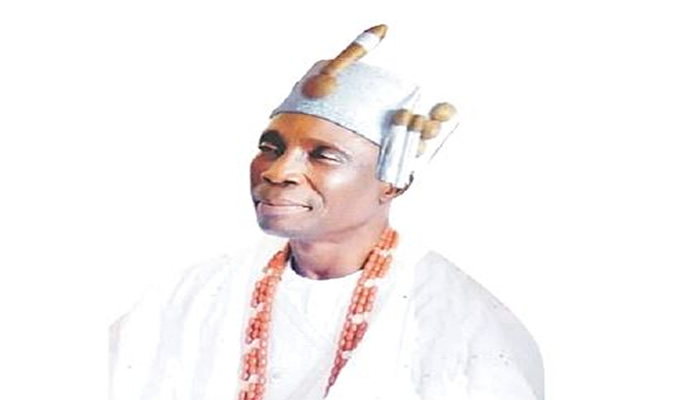
The Kalasuwe of Apoi land in the Ese Odo Local Government Area of Ondo State, Prof Sunday Amuseghan, talks to PETER DADA about the disagreement between his community and indigenes of Ikale in Irele Local Government Area of the state over land ownership
It was reported that there is a conflict between your people and the Ikale in Irele over a land matter. What are the issues?
We are not Ikale, if the others claim to be Ikale. We are Ijaw Apoi, and our people in Ese Odo (local government area) are Ijaw-Arogbo. Historically, Ijaw and Arogbo people are of the same origin. Many centuries ago, when we arrived where we are now, we met a virgin land. We didn’t meet anybody there. People met us there. Nobody has ever conquered us in war, though we do have disputes on land. The surrounding neighbours who share boundaries with us presently, share the same culture. We allowed the Ikale to mingle with us but they are now claiming ownership of our land. That’s too bad. Initially, there was a traditional agreement that they were to pay royalty to us, for those who did not marry our daughters. So we were close, we interacted and we became friends. Now, they are abusing that relationship by claiming that the land belongs to them.
You led a protest at the recent public hearing on the creation of local council development areas in Ondo State. What triggered that action?
The protest we staged during the public hearing was related to the issue between Irele, Ebute Obon, and Igbobini communities in Apoi land. There have been some disputes over the land and the case has been in court since 1948. The indigenes of Irele and those from Aye are claiming ownership of the area due to the discovery of bitumen in Igbobini. They are now trying to claim that the land is situated in Irele because of the bitumen. That is the issue that fuelled the dispute. For the Ijaw Arogbo community, on the same map, in Ajakpa and other areas, some villages belong to the Ijaw and Arogbo. Those people are fond of grabbing other people’s land; they should restrict themselves to their land and leave our land alone.
Nigerians and the international community should tell them to restrict themselves to their land and not to encroach on our land because we will never encroach on theirs. We inherited the land from our forefathers, so we will not allow anybody to take our land.
What have the monarchs and the state government done so far to resolve the matter?
The traditional rulers in the communities and the state government have intervened. The case is even at the federal level; the National Boundary Commission is an agency of the Federal Government. There is a map covering all the states and local government areas and tampering with the map is an offence punishable under the law in Nigeria. So, we will never allow injustice to prevail on this matter.
Have you notified the National Boundary Commission, being the agency of government with the responsibility to handle matters like yours?
We have informed them but they haven’t come out with a clear decision on the demarcation.
Why has it been difficult for the parties involved to reach a compromise on the land dispute?
We have met several times and the government said we should maintain the status quo, but the other party will never maintain the status quo. They encroach every day, particularly between Igbobini and Irele, between Igbobini and Odeaye, between Igbotu and Ajagba, and Igbotu and Ajagba. Many high-profile cases nowadays are land disputes. That land belongs to us. I insist.
The state government should set up a committee and act immediately not to delay demarcating that land. To do that boundary adjustment, the boundary commission should come and do the needful that will bring peace. We need peace, we have always been doing business together. We socialise and traditionally we are together, that is what is called unity in diversity. The diversity should strengthen us; you bring your rich culture and I bring mine. Together, they can lead to robust economic and political development.
Do you think the creation of the local council development areas by the Ondo State Government can resolve the problem?
We need it, and that is why we appreciate the Governor Rotimi Akeredolu Government in Ondo State for taking that proactive step to create LCDAs as Bola Tinubu did (in Lagos) while serving as the governor of Lagos State, bringing development to the state. However, we shouldn’t do anything that will cause a crisis in the name of development, by taking another man’s land. The communities living on the land have been there for many centuries. Let the communities remain where they are. Don’t bring communities from Apoi to Ikale and don’t bring Ikale to us. We don’t need them. Let them stay with their people and let our people stay with us.
We will not allow them to take our land. So, the boundary commission should settle it. It should come to our area and call the stakeholders for a meeting and discuss the issue. We know our boundaries, and they know theirs, but because of greed, they want to colonise us. That time has passed. No more colonialism; no more imperialism.
You have representatives in the federal and state legislatures. What are they doing about the matter at the legislative level?
Nobody has come to me concerning this matter. The person representing us, the current senator, is an Ikale man. You cannot rule out bias. He could be biased against us to favour his people. If the senator representing Ondo South Senatorial district has heard about this issue, he is one of us but he has not come to us, looking for the possibility of resolving the matter. That means he is against us.
Most senators we have before now are all from Ikale. I’m not saying they didn’t do anything for our senatorial district as a whole during their respective years. They tried their best. However, on this land issue, I’ve not seen anything from them.
You seem to have your people’s support, based on the number of people who accompanied you to the public hearing. What is your vision for the people you lead?
I plan to bring my people together to live peacefully with other communities, which will bring development. There must be unity in diversity. I want my people to relate with people from the neighbouring towns. I want them (neighbouring towns) to do the same thing for us so that we will coexist peacefully. The Ese Odo and Ilaje communities share one federal constituency in the House of Representatives. There is no way we can run from them and they can’t run away from us.
People have been clamouring for traditional rulers to be assigned constitutional roles. Do you think this is a step in the right direction?
It is very good. In the First Republic, traditional rulers were given constitutional roles to play. For instance, my predecessor, Oba Samuel Adetimehin, who spent 52 years on the throne, represented the old Ondo South Senatorial district. The old constitution gave room for that but the 1999 Constitution removed such a role for traditional rulers; we have been reduced to ordinary citizens. The idea behind the existence of a local government is to bring governance to the grassroots. Who are the grassroots? But when politicians come to the palace, they want us to support them. Let traditional rulers be given roles backed by the Constitution. Recently, the Senate said it would restore the roles of monarchs. We are expecting that and we are praying for them to be able to do that.





